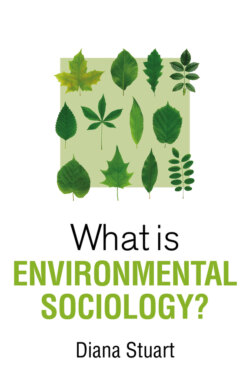Читать книгу What is Environmental Sociology? - Diana Stuart - Страница 7
In Uncharted Waters
ОглавлениеAs we now face global and existential environmental threats, environmental sociology has never been more important. Early environmental issues such as the pollution in the Cuyahoga River and Love Canal were regional. While we still face these kinds of environmental issues, which threaten humans and other species in certain places, we now also face environmental crises that are existential because they threaten the future existence of our species and others. Environmental issues have been on the social radar for decades, yet we have reached a new era of global and existential environmental threats.
Calling these threats “existential” may sound extreme or exaggerated, but unfortunately it is not. We face unprecedented global environmental impacts putting our existence at risk. In recent reports from the Intergovernmental Panel on Climate Change (IPCC 2018) and the Intergovernmental Science-Policy Platform on Biodiversity and Ecosystem Services (IPBES 2019), scientists have illustrated the severity of both the climate and biodiversity crises and how current trajectories put us at risk of societal collapse, massive population loss, and even possible extinction. These reports call for rapid and unprecedented changes in all aspects of society to address these crises and minimize ecological and social impacts. The climate and biodiversity crises together pose a global existential threat to the human race. While these two distinct crises are discussed here, they will sometimes be grouped together and referred to as “the environmental crisis” or “existential threats” throughout the book.
With only about a 1.1° Celsius (C) average global temperature increase thus far, we are already seeing serious impacts due to global climate change, including unprecedented fires, floods, and hurricanes; and much more severe impacts are projected as warming continues. The words “crisis” and “emergency” are increasingly used by scientists and in the media to describe climate change. Steffen and colleagues (2018) explain the very real possibility of reaching a critical threshold of warming, a global tipping point, after which additional warming would be uncontrollable, resulting in a “Hothouse Earth” scenario. In Nature, Lenton and colleagues (2019: 595) state that climate change “is an existential threat to civilization,” explaining that “the evidence from tipping points alone suggests that we are in a state of planetary emergency.” Finally, Ripple and colleagues (2019: 1), representing the Alliance of World Scientists, identify “disturbing” and “worrisome” vital signs that they state “clearly and unequivocally” illustrate we are in a “climate emergency.” Klinenberg et al. (2020: 664) and other sociologists argue that climate change needs to be a central focus in all subdisciplines of sociology, as it is rapidly transforming the conditions of life on the planet for all people and “everything is at stake.”
Although the climate crisis contributes to biodiversity loss, the biodiversity crisis is considered a separate yet related crisis. Biodiversity loss receives much less public attention than climate change, yet it too poses an existential threat to humans. Imagine the impacts on humans if extinction cascades resulted in the loss of insect pollination or the loss of all ocean life. This is why terms like “ecological crisis” and “biodiversity crisis” are now commonly used by scientists and in the media. For example, a letter representing almost 100 scientists was published in October of 2018 titled: “Facts about our ecological crisis are incontrovertible” (Green and Scott Cato 2018). A year later, the United Nations report on biodiversity and ecosystem services (IPBES 2019) resulted in scientists publicly calling for rapid funding and intervention to address the “biodiversity crisis” (Malcom et al. 2019). The IPBES media release (2019) states that species loss has accelerated to rates that “constitute a direct threat to human well-being in all regions of the world.” The climate and biodiversity crises can both be seen as “crises of civilization” that together represent an unprecedented existential threat.
The climate and biodiversity crises are related, as climate change increases extinction rates, but they are also related in how the impacts of these crises are unfolding, who is most affected, the underlying drivers, and the likely solutions. Environmental sociology can play a critical role in understanding these impacts, drivers, and solutions. Already, environmental sociologists are working to identify unequal and unjust impacts, root drivers of impacts that are overlooked by oversimplified diagnoses, the ineffectiveness and inadequacy of proposed solutions, and the extent of social transformation necessary to stave off these existential threats. While this book will draw from examples beyond these global crises, it will emphasize how current and future environmental sociologists can contribute to understanding and addressing these escalating threats. We are in uncharted waters, and environmental sociologists can play an important role identifying and advocating for the most effective and just paths forward.
While crises create uncertain and daunting times, they also can create opportunities for change that can be positive. Having plans for positive social transformation already formulated is critical for being prepared to direct the path of change. It is those who have studied and who understand the impacts and drivers of problems who can point us in the direction of effective and just solutions. Conditions can rapidly change due to environmental, economic, and health crises (e.g., the Covid-19 pandemic) and ideas that were previously deemed unfeasible can suddenly gain popular support. As windows open for positive social change, environmental sociologists can play a key role in identifying effective solutions and helping to steer society toward paths that increase social and ecological well-being. This important work requires a thorough understanding of the complex relationships between nature and society.
